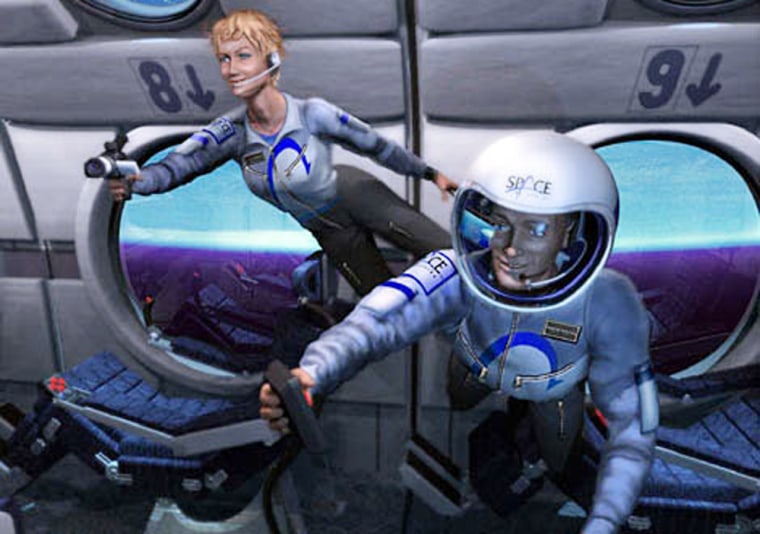America's top rivals in the private-sector space race are now on the same side, in a federation newly formed to advance their infant industry's interests.
The Personal Spaceflight Federation, whose establishment was announced Tuesday, brings together a who's who of space entrepreneurs, including SpaceShipOne designer Burt Rutan, whose team won the $10 million X Prize last October, and video-game genius John Carmack, whose Armadillo Aerospace team was among the leading contenders for the prize.
The industry group plans to work with federal regulators to help draw up the "rules of the road" for suborbital space tourism, following up on last year's landmark law on private-sector spaceflight, said Gregg Maryniak, who serves as the federation's chief spokesman as well as executive director of the X Prize Foundation.
"This new legislation basically says that government and industry need to work together to come up with safety standards, and we believe very strongly that industry's going to have to come up with a product that's considerably safer than the current civil space program," he told MSNBC.com.
Maryniak cited "survey after survey after survey" indicating that 70 percent of Americans would buy a flight into space if they had the chance and the price was right. The federation grew out of discussions about how to capitalize on the new legislation and create a true industry to serve that demand, Maryniak said.
"Where we can, we will speak with one voice to the regulators," Maryniak said. "Just like in the early days of aviation, rivals often pull together to help each other out. ... There's a feeling that this is a time to pull together."
Leading industry figures
The federation's other founding members are:
- SpaceX's Elon Musk, who is taking aim at a $50 million prize for orbital spaceflight.
- Alex Tai of Virgin Galactic, which is working with Rutan to begin commercial suborbital tours by 2008.
- Stuart Witt, director of the Mojave Spaceport in California.
- Michael Kelly, chairman of the RLV Working Group at COMSTAC, the U.S. Transportation Department's industry advisory committee.
- Jeff Greason of XCOR Aerospace.
- Gary Hudson of T/Space and HMX.
- George French of Rocketplane Ltd.
- Eric Anderson of Space Adventures.
- Peter Diamandis, the X Prize Foundation's chairman.
Other suborbital industry figures may join as well, said Diane Murphy, a spokeswoman for the group.
Maryniak declined to discuss who will be leading the federation or precisely how it will draw up its proposed safety regulations.
"All that will be revealed, but it's premature," he said. "Watch this space."
What's ahead for the rocket industry?
The spaceflight legislation passed last year calls on the Federal Aviation Administration to draft regulations for piloted suborbital spaceflights over the next 12 months, including provisions that would allow paying passengers to fly at their own risk.
The federation's work should dovetail nicely with other industrywide efforts, said Andrew Case, acting director of the Washington-based SubOrbital Institute. "It certainly sounds like an excellent idea," he told MSNBC.com. "The industry needs to move toward a self-policing model."
Case said the federation could function as the outer-space equivalent of the Insurance Institute for Highway Safety — a nongovernmental group that is funded by insurers to promote automobile safety standards.
"Something similar would be good to have for the suborbital industry," Case said.
Wider agenda
Case said his group had a wider agenda, because its members are involved in unmanned as well as manned suborbital spaceflight. This week, the SubOrbital Institute and its supporters are on Capitol Hill to lobby lawmakers and their staffs for a loosening of technology export restrictions.
Case argued that the State Department restrictions — known as International Traffic in Arms Regulation, or ITAR — were holding back the space industry.
"Anything that involves a rocket engine falls under ITAR," he said. "So say a company wanted to hire an aerospace engineer from Australia. They wouldn't be able to discuss some basic elements of engine design because of ITAR."
The restrictions also limit U.S. aerospace companies' ability to learn about technologies from other countries, or secure launch insurance from foreign-based insurers, he said. "They hurt U.S. industries, give competitive advantage to non-U.S. industries and provide no national security advantage," Case said.
However, Case acknowledged that it's not easy to get those arguments across to Congress in a post-9/11 world.
"Nobody's going to leap to tackle the issue, because nobody wants to appear weak on national security," he said. "We're not proposing to export rocket engines to North Korea, but it would be nice to be able to hire Japanese engineers."
Thus, this week's lobbying represents more of a consciousness-raising effort than an attempt to further any specific legislation this session. Case said another opportunity for consciousness-raising comes Wednesday, when the House Aviation Subcommittee conducts a hearing on commercial space transportation, subtitled "Beyond the X Prize."
"We need to make sure we're on the radar screen as something that's worth investing time in from the standpoint of senators and representatives, so they will realize this is not just pie-in-the-sky stuff," Case said.
